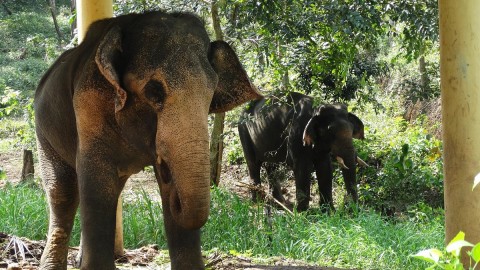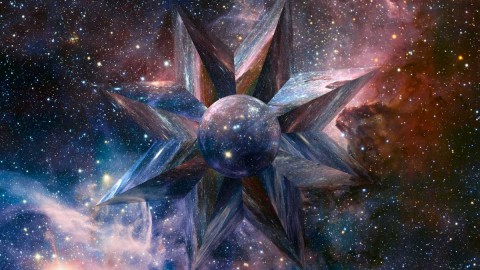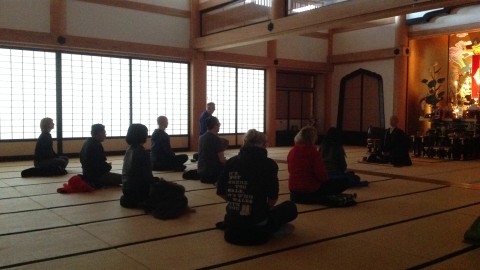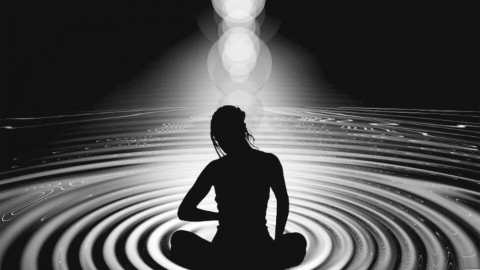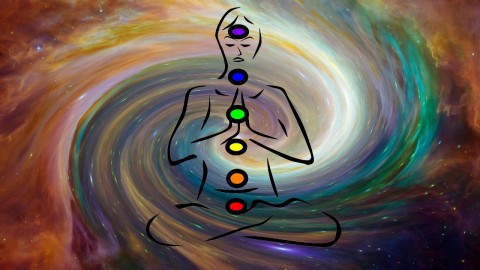VISESA-DARSINA ATMA-BHAVA-BHAVA NAVINIPATTI.
WHEN ONE HAS SEEN THIS DISTINCTION, THERE IS A CESSATION OF DESIRE FOR DWELLING IN THE ATMA, THE SELF.
BUDDHA HAS CALLED the ultimate state of consciousness anatta – no self, non-being. It is very difficult to comprehend it. Buddha has said that the last desire to drop is the desire to be. There are millions of desires. The whole world is nothing but desire objects, but the basic desire is to be.
The basic desire is to continue, to persist, to remain. Death is the greatest fear; the last desire to be dropped is the desire to be.
Patanjali in this sutra says: when your awareness has become perfect, when viveka, discrimination has been achieved, when you have become a witness, a pure witness of whatsoever happens, outside you, inside you…. You are no more a doer, you are simply watching; the birds are singing outside… you watch; the blood is circulating inside… you watch; the thoughts are moving inside… you watch – you never get identified anywhere. You don’t say, “I am the body”; you don’t say, “I am the mind”; you don’t say anything. You simply go on watching without being identified with any object. You remain a pure subject; you simply remember one thing: that you are the watcher, the witness – when this witnessing is established, then the desire to be disappears.
And the moment the desire to be disappears, death also disappears. Death exists because you want to persist. Death exists because you don’t want to die. Death exists because you are struggling against the whole. The moment you are ready to die, death is meaningless; it cannot be possible now. When you are ready to die, how can you die? In the very readiness of dying, disappearing, all possibility of death is overcome. This is the paradox of religion.
Jesus says, “If you are going to cling to yourself, you will lose yourself. If you want to attain yourself, don’t cling.” Those who try to be are destroyed. Not that somebody is there destroying you; your very effort to be is destructive because the moment the idea arises: “I should persist,” you are moving against the whole. It is as if a wave is trying to be against the ocean. Now the very effort is going to create worry and misery, and one moment will come when the wave will have to disappear. But now, because the wave was fighting against the ocean, the disappearance will look like death. If the wave was ready, and the wave was aware: “I’m nothing but the ocean, so what is the point in persisting? I have always been and I will always be, because the ocean has always been there and will always be there. I may not exist as a wave – wave is just the form I have taken for the moment. The form will disappear, but not my content. I may not exist like this wave; I may exist like another wave, or I may not exist as a wave as such. I may become the very depth of the ocean where no waves arise….”
But the innermost reality is going to remain because the whole has penetrated you. You are nothing but the whole, an expression of the whole. Once awareness is established, Patanjali says, “When one has seen this distinction, that ‘I am neither this nor that’, when one has become aware and is not identified with anything whatsoever, there is a cessation of desire for dwelling in the atma, in the self.” Then the last desire disappears, and the last is the fundamental. Hence, Buddha says, “You can drop desiring money, wealth, power, prestige – that’s nothing. You can stop desiring the world – that’s nothing – because those are secondary desires. The basic desire is to be.” So people who renounce the world start desiring liberation, but liberation is also their liberation. They will remain in moksha, in a liberated state. They desire that pain should not be there. They desire that misery should not be there. They will be in absolute bliss, but they will be. The insistence is that they must be there.
That’s why Buddha could not get roots into this country which thinks itself very religious. The most religious man who was born on this earth could not get roots into this religious country. What happened? He said, he insisted, to drop the basic desire of being: he said, “Be a non-being.” He said, “Don’t be.” He said, “Don’t ask for liberation because freedom is not for you. Freedom is going to be freedom from you; not for you, but from you.”
Liberation is liberation from yourself. See the distinction: it is not for you; liberation is not for you. It is not that liberated you will exist. Liberated, you will disappear. Buddha said, “Only bondage exists.”
Let me try to explain it to you.
Have you ever come across health? You have been healthy many times, but can you say what health is? Only disease exists. Health is non-existential; you cannot pin-point it. If you have a headache you know it is there, but have you ever known the absence of headache? In fact, if there is no headache the head also disappears. You don’t feel it anymore. If you go on feeling your head, that simply shows that there must be a certain tension inside, a certain stress, a strain. A sort of headache must be there continuously. If your whole body is healthy, the body disappears. You forget that the body is. In Zen, when meditators sit for many years, just sitting and doing nothing, a certain moment comes when they forget that they have bodies. That is their first satori. Not that the body is not there; the body is there but there is no tension, so how to feel it? If I say something you can hear me, but if I’m silent how can you hear me? Silence is there – it has much to communicate to you – but silence cannot be heard. Sometimes when you say, “Yes, I can hear the silence,” then you are hearing some noise. Maybe it is the noise of the dark night but it is still noise. If it is absolutely silent, you will not be able to hear it. When your body is perfectly healthy, you don’t feel it. If some tension arises in the body, some disease, some illness, then you start hearing. If everything is in harmony and there is no pain and no misery, suddenly you are empty. Nothingness overwhelms you.
Kaivalya is the ultimate health, wholeness, all wounds healed. When all wounds heal, how can you exist? The self is nothing but accumulated tension. The self is nothing but all sorts of diseases, illnesses. The self is nothing but desires unfulfilled, hopes frustrated, expectations, dreams – all broken, fractured. It is nothing but accumulated disease, that you call ‘self’. Or take it from another side: in moments of harmony you forget that you are. Later on, you may remember how beautiful it was, how fantastic it was, how far-out. But in moments of real far-outness, you are not there.
Something bigger than you has overpowered you; something higher than you has possessed you; something deeper than you has bubbled up. You have disappeared. In deep moments of love, lovers disappear. In deep moments of silence, meditators disappear. In deep moments of singing, dancing, celebration, celebrators disappear. And this is going to be the last celebration, the ultimate, the highest peak – kaivalya.
Patanjali says, “Even the desire to be disappears. Even the desire to remain disappears.” One is so fulfilled, so tremendously fulfilled that one never thinks in terms of being. For what? – You want to be there tomorrow also because today is unfulfilled. The tomorrow is needed; otherwise you will die unfulfilled. The yesterday was a deep frustration; today is again a frustration; tomorrow is needed.
A frustrated mind creates a future. A frustrated mind clings with the future. A frustrated mind wants to be because now, if death comes, no flower has flowered. Nothing has yet happened; there has only been a fruitless waiting: “Now, how can I die? I have not even lived yet.” That unlived life creates a desire to be.
People are so much; afraid of death: these are the people who have not lived. These are the people who are, in a certain sense, already dead. A person who has lived and lived totally does not think about death. If it comes, good; he will be welcome. He will live that too, he will celebrate that too.
Life has been such a blessing, a benediction; one is even ready to accept death. Life has been such a tremendous experience; one is ready to experience death also. One is not afraid because tomorrow is not needed; today has been so fulfilling. One has come to fruition, flowered, bloomed. Now the desire for tomorrow disappears. The desire for tomorrow is always out of fear, and fear is there because love has not happened. The desire to always remain simply shows that deep down you are feeling yourself, completely meaningless. You are waiting for some meaning.
Once the meaning has happened, you are ready to die – silently, beautifully, gracefully.
“Kaivalya,” Patanjali says, “happens only when the last desire to be has disappeared.” The whole problem is to be or not to be. The whole life we try to be this and that, and the ultimate can happen only when you are not.
WHEN ONE HAS SEEN THIS DISTINCTION, THERE IS A CESSATION OF DESIRE FOR DWELLING IN THE SELF.
The self is nothing but the most purified form of the ego. It is the last remnant of strain, stress, tension. You are still not perfectly open; something is still closed. When you are completely open, just a watcher on the hill, a witness, even the death desire disappears. With the disappearance of this desire, something absolutely new happens in life. A new law starts functioning.
You have heard about the law of gravitation; you have not heard about the law of grace. The law of gravitation is that everything falls downwards. The law of grace is that things start falling upwards.
And that law has to be there because in life everything is balanced by the opposite. Science has come to discover the law of gravitation: Newton sitting on a bench in a garden saw one apple falling – it happened or not; that is not the point – but seeing that the apple was falling down, a thought arose in him: “Why do things always fall downwards? Why not otherwise? Why doesn’t a ripe fruit fall upwards and disappear into the sky? Why not sideways? Why always downwards?” He started brooding and meditating, and then he discovered a law. He came upon, stumbled upon a very fundamental law: that the earth is gravitating things towards itself. It has a gravitational field. Like a magnet, it pulls everything downwards.
Patanjali, Buddha, Krishna, Christ – they also became aware of a different fundamental law, higher than gravitation. They became aware that there comes a moment in the inner life of consciousness when consciousness starts rising upwards – exactly like gravitation. If the apple is hanging on the tree, it does not fall. The tree helps it not to fall downwards. When the fruit leaves the tree, then it falls downwards.
Exactly the same: if you are clinging to your body you will not fall upwards; if you are clinging to your mind you will not fall upwards. If you are clinging to the idea of self, you will remain under the impact of gravitation – because the body is under the impact of gravitation, and mind also. Mind is a subtle body; the body is a gross mind. They are both under the impact of gravitation. And because you are clinging to them you are not under the impact of gravitation, but you are clinging to something which is under the impact of gravitation. It is as if you are carrying a big rock and trying to swim in a river; the rock will pull you down. It won’t allow you to swim. If you leave the rock, you will be able to swim easily.
We are clinging to something which is functioning under the law of gravitation: body, mind. “Once,”
Patanjali says, “You have become aware that you are neither the body nor the mind, suddenly you start rising upwards.” Some center somewhere high in the sky pulls you up. That law is called ‘grace’.
Then God pulls you upwards. And that type of law has to be there, otherwise gravitation could not exist. In nature, if positive electricity exists, then negative electricity has to exist. Man exists, then the woman has to exist. Reason exists, then intuition has to exist. Night exists, then the day has to exist. Life exists, then death has to exist. Everything needs the opposite to balance it. Now science has become aware of one law: gravitation. Science still needs a Patanjali to give it another dimension, the dimension of falling upwards. Then life becomes complete.
You are a meeting place of gravitation and grace. In you, grace and gravitation are criss-crossing.
You have something of the earth and something of the sky within you. You are the horizon where earth and sky are meeting. If you hold too much to the earth, then you will forget completely that you belong to the sky, to infinite space, and beyond. Once you are no longer attached with the earth part of you, suddenly you start rising high.
Tags: Patanjali Yoga Sutra 50 Last Celebration

